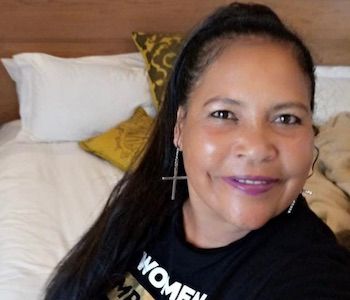Angela Witbooi

Summary: Angela Witbooi is a human rights activist who initiates development programs and supports victims of human rights violations in the West Coast of South Africa. In 2016 Witbooi and her colleagues formed the West Coast Food Sovereignty and Solidarity Forum in order to promote food security and togetherness. She has endured numerous threats as a result of her activism but soldiers on.
Profile: Born and raised in Paarl, South Africa, in 1968 Witbooi moved to Lutzvllie, a small rural town and farming community in the West Coast where most people live in abject poverty. Witbooi noticed that “the majority of people in Lutzvllie are seasonal farm workers, with little or no education, and they are afraid to challenge injustice.” On seeing this vacuum, Witbooi and her colleagues formed the West Coast Food Sovereignty and Solidarity Forum, a women-led organisation to promote sustainable food production and togetherness.
This is far from the only type of activism that Witbooi has engaged in. She has spent most of her life working to advance human rights locally and internationally: When Witbooi realised that people were afraid to speak out against exploitation and injustice, she chose to be their spokesperson, beginning by assisting victims of human rights abuse to launch claims with the police. When she noticed that crimes in her community were increasing but people were unwilling to report those crimes, she organised trainings on how to handle court cases: “l also do advocacy programs to train people how to handle their cases. I go with people to the police station so their cases must be taken. I also go to the court to support them in their cases.” This is especially important for migrant workers, because, says Witbooi, “Most of them are illegal in the country and cannot lay cases when they are attacked or robbed by local people.” Another issue that got Witbooi’s attention: After noticing increasing cases of bullying in South African schools, she and her colleagues organised anti-bullying programs with students.
In February 2019, Witbooi and her colleagues, in partnership with climate justice organisations, mobilised mining communities and fearlessly staged a protest in
Cape Town during a meeting between the Minister of Mines and Mineral Resources and Mineral Sands Resources, a subsidiary of Australia’s Mineral Commodities Resources. The protest was launched under the theme #RightToSayNo to mining. In a statement to Environment South Africa, Witbooi said, “The coastal communities are no longer able to find fish along the coast, and agricultural activities have been severely affected due to growing sand piles at local mining dumps.” This is a common tragedy for South Africa's mining communities.
In December 2020, Witbooi, in partnership with other organisations in Cape Town, took to the streets to hand over a memorandum of demands to parliament and provincial government against farm evictions and the right of farm workers and their children. She also organises programs to teach women to grow their own food: “We do advocacy programs on climate justice and agroecology. We started community gardens with indigenous seeds we received from farmers. We do skills development training with women and youth to generate their own income,” said Witbooi. Witbooi is convinced that in order to end hunger and starvation, communities must feed themselves and stop dependence on chemical foods that destroy the environment and the human body. Article 290 of the United Nations empowers indigenous people, including coastal fishing communities, to have access to their territories and control over their fishing areas and ecosystem.
Witbooi is also known for monitoring xenophobic and gender-based violence (GBV) in the West Coast. As cases of gender-based violence increase—Police Minister Bheki Cele recently reported that within three months, police recorded 10,516 rape cases, 1,514 cases of attempted murder, and 14,501 assaults against female victims—Witbooi and her colleagues take the lead, training women and men on how to handle such violence. Unlike other organisations that target only women to fight gender-based violence, Witbooi and her colleagues have strived to make men more conscious of the issue.
Witbooi’s work has come with disadvantages and dangers. She notes that on several occasions her family has suffered as she selflessly provides food to hungry families: “Sometimes people knock on my door for something to eat, and I take the food of my children to share. People always think of me because I put the community first.”
Moreover, in South Africa's hostile environment, where many activists have either been killed or are in hiding, Witbooi is not immune from the threats: “On several times I was threatened with death because of my work.” In particular, her awareness campaigns on climate justice generated trouble. When she challenged a local mining company for polluting the oceans—which posed a danger to animal, fish, and human life—she was again threatened with death. And the company sued her for R7,5 million rands, based on an alleged defamation of character.
In the face of continued persecution, Witbooi shares her strategy to counter those against her work: “I am always careful when walking around during the night because I don't know who my enemies are.”
She has a positive strategy as well: “Always treat people with respect. Do good to others with the wisdom you were taught by the elders in society. By doing this, your generation will prosper.”
